
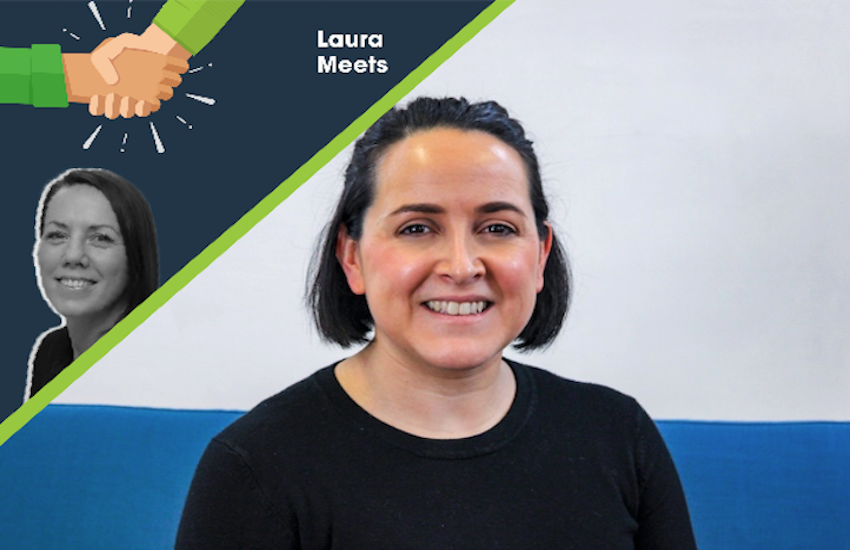

Cancer runs through generations of Vikki Hammond’s family so when she herself was diagnosed her reaction was simply: "I thought so".
"I just knew. I didn’t even cry,” she said.
Her seemingly easy acceptance of her diagnosis belies the tough times she faced during her treatment.
Her children were very young and one of her main aims was to protect them from the harsh realities of her illness. Her diagnosis and treatment also coincided with covid so she had to be especially careful to protect herself against the virus, while also being isolated from family and friends at times.
Her story starts a long time before 2020 though. And it's a story which demonstrates the advancements made in medical treatments over the past four decades.
"The story starts probably over 30 years ago, just as I was born," explained Vikki.
"A relative of my mum got diagnosed with breast cancer at 27. She was the youngest at that time in Guernsey to be diagnosed, and at that time, Southampton and Cancer Research was beginning its research into genetics.
"They asked my auntie if she would give a sample of her tissue to be tested. And it was then that they identified that she carries this BRCA gene mutation, and they asked if anyone else in the family would want to be tested."

Pictured: Taken from the Cancer Research UK website.
For Vikki's family, the discovery of this gene means they know that a number of relatives are carriers, and she is one of a number of her family members who have subsequently been diagnosed with cancer.
Vikki's mum was tested and found to be a carrier, while her sister is not a carrier.
"My mom had her (test) in, I think 1995. She told us that there was this gene in the family, that she had it, which made her more likely to get cancer. It's not 100% that you're going to get it, but it increases your chances, so she just made us aware of this so that we could tell doctors if anything was to ever happen to us."
Vikki said having this knowledge is an emotional rollercoaster.
"I'm guessing she felt some sense of guilt that she'd passed this on to me. She's never had breast cancer, so it's always that why you not me sort of thing."
Four members of Vikki's extended family have been diagnosed, with more as carriers.
Her own diagnosis came after the birth of her daughter.
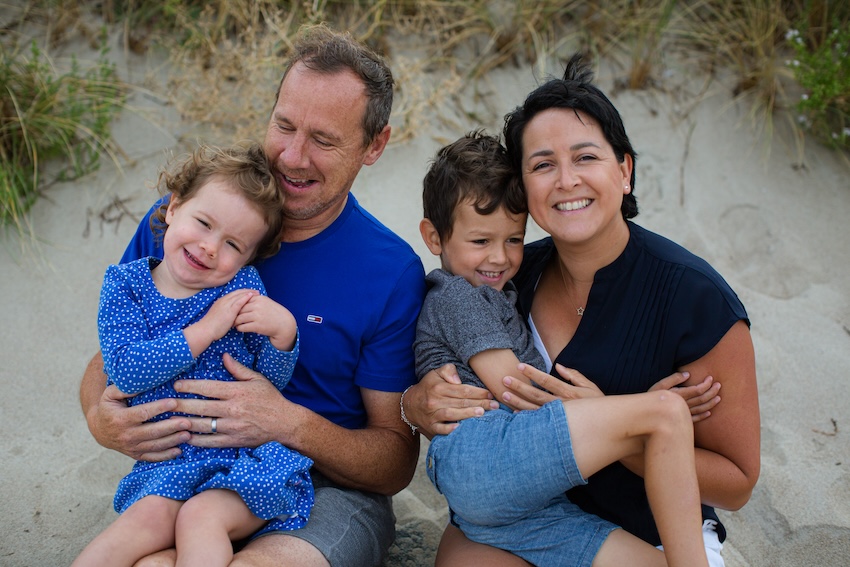
Pictured: Vikki Hammond and her family. (Sarah Froome Photography)
"I went to the doctor for my postnatal checkup, and they started talking about contraception. She said 'Oh, I realise that you have a BRCA family, have you ever thought about getting tested?"
"I thought, 'let's do it?'
"That was March 2020 and covid came along so I couldn't go away to be tested. I spoke to the clinic in Southampton and they agreed that they would treat me as if I was a carrier, given my strong family history, and agreed that I could just go in the screening programme now.
"I didn't have a first screening until November 2020, and unbeknown to me in that screening in November 2020 they found something.
"In January 21 they asked me to come back for another MRI again. They hadn't told me they'd found anything, I think from what I understand now is that the location and where it was and the size they were like, 'oh, is this just an abnormality? Let's test you again and see if it's there or not'.
"So they tested me again and it was still there.
"In May 21 they asked me to come for an ultrasound, and that's when they told me that they found something which was a shock because I hadn't been told anything before, so I was there on my own.
"I remember I was up at the clinic on my own, I'd just told my husband it'll be 10 minutes and I phoned him up in absolute tears, saying that they'd found something and he's really good. He was like 'don't think of it as the worst'. But it's scary."
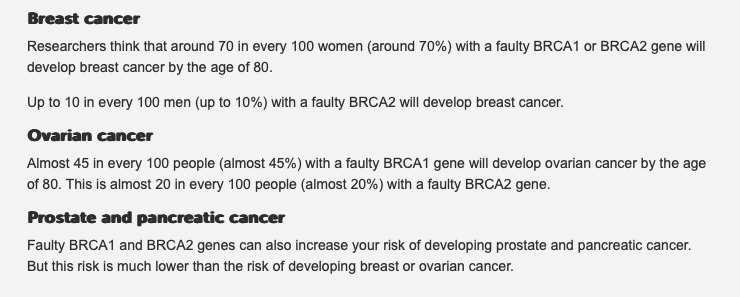
Pictured: Data from the Cancer Research UK website.
After her initial diagnosis, Vikki had a biopsy which confirmed she had breast cancer.
She named it 'Larry the lump' and never used the word cancer around her children.
"I remember (my husband) saying to me 'you're not gonna die' and I was like, 'I'm not dying, I'm not scared I'm going to die, I just don't know what it's going to be like'.
"You're so used to watching these medical dramas, where someone's got cancer and they have chemotherapy and they become really gaunt and they lose their hair. That's what made me cry the most.
"My kids were young, my daughter was just turning two as I got diagnosed and I was like 'am I going to scare them?' so that was my worry. That's what made me cry."
When it came to telling her children what was going on, Vikki said she and her husband tried to keep it as simple as possible.
"We told them that Mummy was really poorly and she had to go to hospital and have some medicine in her arm. And unfortunately, the medicine was so strong it made mummy's hair fall out. But we've never told them cancer or anything like that."
As Vikki's treatment continued she had the support of her friends as well as her family - and she says they were "amazing".
"They all came with me to treatment. They were all fighting 'I want to come this week'. but it was really boring. I actually got really sick when I was going through it, I'd fall asleep, but they all fought to come and spend the day with me or come and sit in bed with me afterwards.
"It was fantastic."
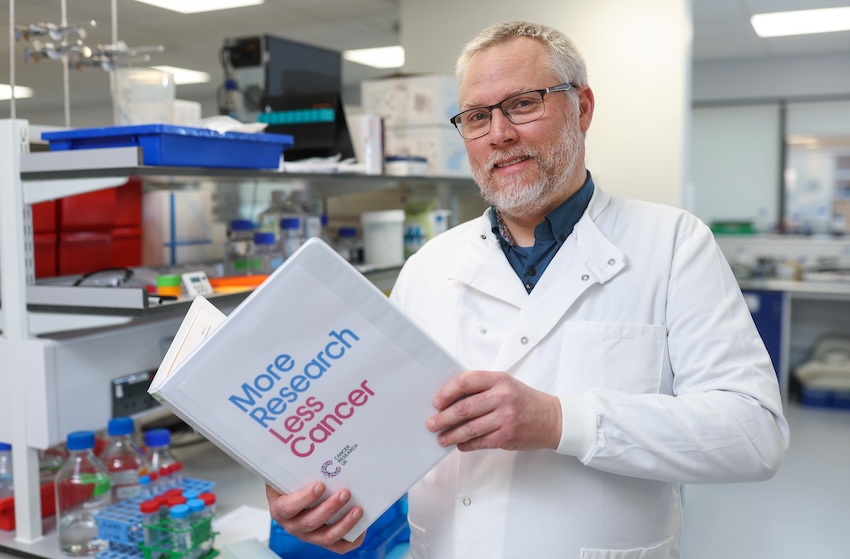
Pictured: Professor Gareth Griffiths is part of the Cancer Research UK team.
All of Vikki's treatment came down to the research that has been funded using charity donations to organisations like Cancer Research UK.
Vikki knows that work helped develop the genetic testing which warned her that she might develop cancer, and it also funded the work developing the treatments she and millions of other people have received.
"...because of that research over 30 years ago, that's how they found my cancer so early and without that research my story could be completely different.
"If they hadn't started it and they hadn't picked up my auntie. I don't think we would know as a family that the majority of us carry this gene so the research that they did and are still doing today is incredible."
Vikki is now backing a campaign which is hoping to raise millions of pounds, with philanthropists asked if they can donate larger sums to aid the research.
"I doubt anyone over here has just got a spare 100 million, just like that in the bank account, but as an island, we can do so much," said Vikki.
"We like supporting fundraising events and donating, even if it's a pound here, like it all goes towards that research, which I said helped me and it will help so many more others."
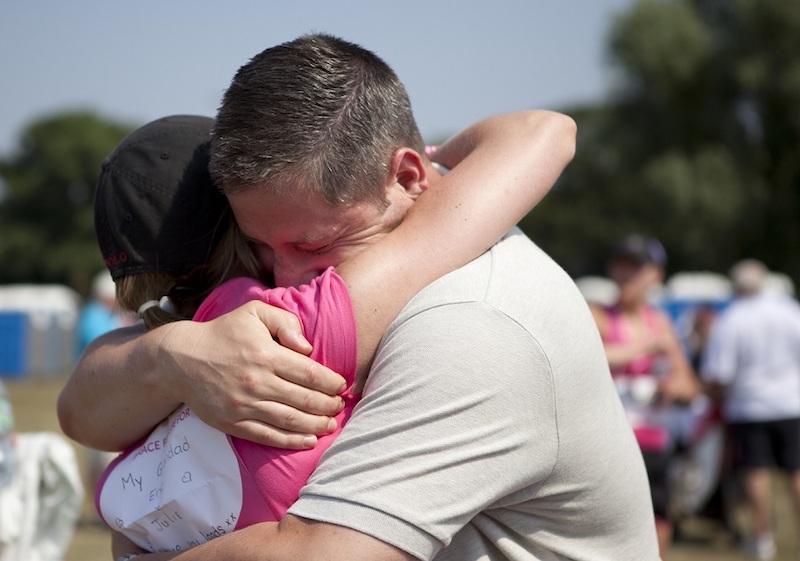
Pictured: Everyone can take part in Guernsey's Our Race for Life, on Sunday 19 May.
One large fundraising event held locally, is the 'Our Race for Life' - organised by Vikki's friend Danni Barnett who is also a BRCA carrier.
Last year 750 people were involved, raising £30,000 for research. This year's event is being held in May.
"I remember the first year I did it, I'd literally had my surgery three months before, so I remember walking it and it was really emotional. Then last year I spoke before it, and this year I hope I'm going to run it.
"There's a 3k and 5k route. We're making it more wheelchair accessible and buggy friendly this year. It starts at the KGV and works its way up to the park, around, and back."
Vikki will be taking part with her eight-year-old son this year.
"Historically, when race for life was over here, I think people still thought it was for women, for breast cancer and things like that, but it's not. It's for cancer research.
"Cancer research looks at all cancers, and cancer doesn't just affect women."
Everything raised locally through the Our Race for Life will go to Cancer Research with research being carried out at the Southampton Hospital.
"The majority of people in Guernsey will end up at Southampton for part of their treatment so you're ultimately helping potentially yourself in the future or family member or friends," said Vikki.
"They also developed two of the drugs that I received as part of my treatment. They were developed and funded and researched by Cancer Research."
Comments
Comments on this story express the views of the commentator only, not Bailiwick Publishing. We are unable to guarantee the accuracy of any of those comments.